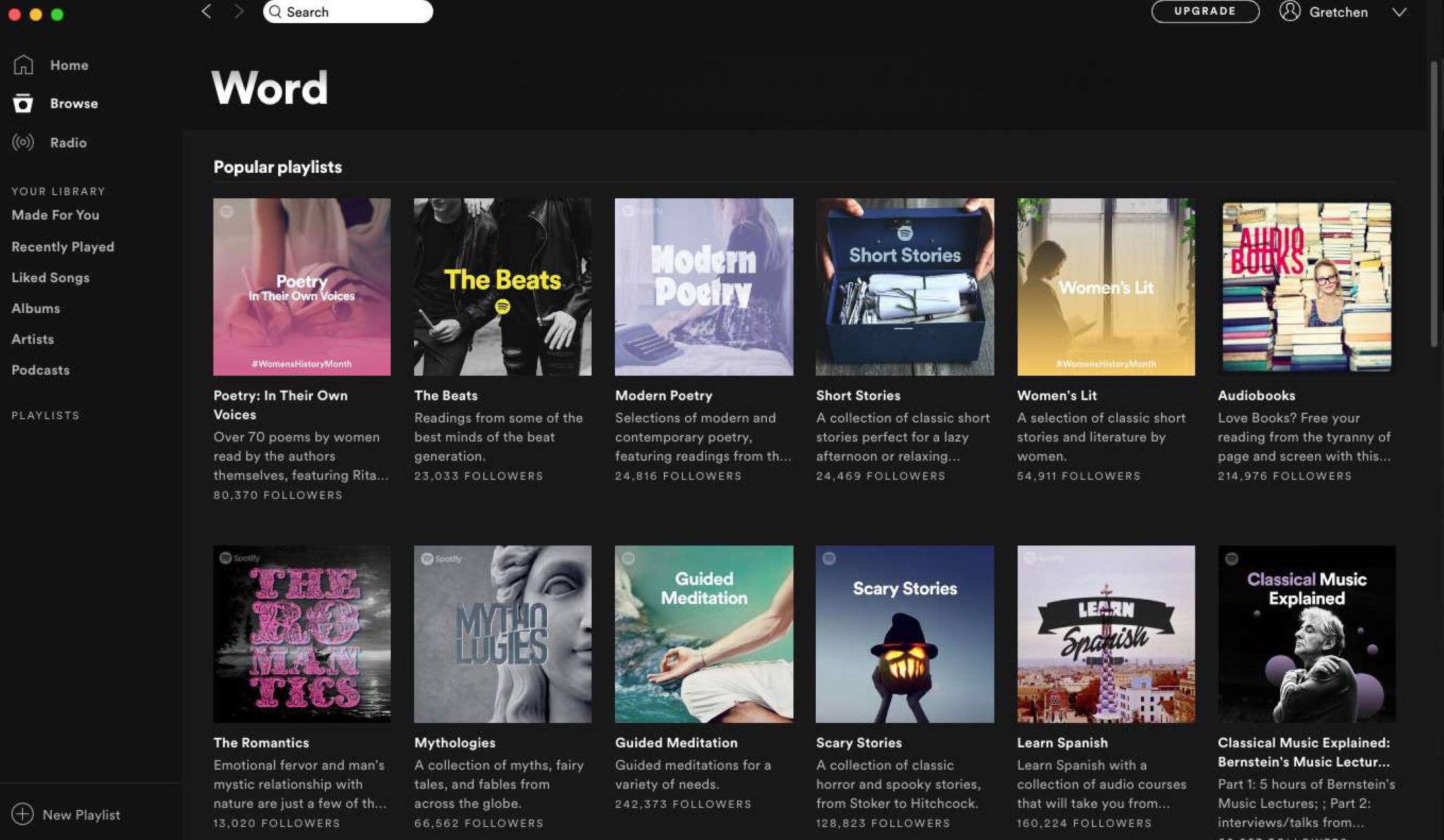Introduction
Welcome to the world of podcasts! Whether you’re a podcast creator or simply a curious listener, you may be wondering how to gauge the popularity of a podcast on Spotify. Understanding the number of listeners a podcast has can provide valuable insights into its reach and influence.
Podcasts have become a powerful medium for sharing information, entertainment, and engaging conversations. Spotify, one of the leading streaming platforms, offers a vast collection of podcasts covering a wide range of topics. With millions of podcasts available, it can be helpful to know how to determine the listener count for a specific show on Spotify.
In this article, we will guide you through the process of finding the number of listeners a podcast has on Spotify. We will also explore other metrics that can give you a more comprehensive understanding of a podcast’s popularity. So, let’s dive in and discover how to unlock this valuable information!
Before we delve into the specifics, it’s important to note that Spotify doesn’t display the exact number of listeners for each podcast. Instead, it provides a range of listeners that falls into one of the following categories: ‘Fewer than 1,000’, ‘1,000-5,000’, ‘5,000-10,000’, ‘10,000-50,000’, ‘50,000-100,000’, or ‘More than 100,000’. While this range isn’t precise, it does give you a general idea of a podcast’s popularity.
However, keep in mind that these listener ranges are not the sole determinants of a podcast’s quality or relevance. Podcasts with a smaller listener count can still offer valuable content, while larger audience numbers may not always signify better quality.
So, let’s go ahead and explore how you can find the number of listeners for a podcast on Spotify, and take a closer look at the factors that influence the listener count.
Finding the Podcast on Spotify
Before you can view the number of listeners for a podcast on Spotify, you need to locate the podcast on the platform. Spotify makes it relatively easy to discover and explore podcasts through its dedicated podcast section.
To find a specific podcast, follow these steps:
- Open the Spotify app on your device and navigate to the “Search” tab at the bottom of the screen.
- Tap on the search bar and enter the name of the podcast you’re looking for. You can also search by the podcast host’s name or keywords related to the podcast’s content.
- From the search results, select the podcast that matches your query. The podcast’s main page will open, displaying its episodes, description, and other relevant information.
If the podcast you’re looking for doesn’t appear in the search results, it’s possible that it’s not available on Spotify. Not all podcasts are listed on every streaming platform, so you may need to explore other podcast directories or the podcast’s official website to find alternative listening options.
Once you’ve successfully located the podcast on Spotify, you can proceed to the next step: viewing the number of listeners.
Now, let’s move on to the next section to learn how to access the listener count for a podcast on Spotify.
Viewing the Number of Listeners
While Spotify doesn’t provide an exact number of listeners for each podcast, it does offer a range that gives you an idea of the show’s popularity. To view the listener count for a podcast on Spotify, follow these steps:
- Go to the podcast’s main page on Spotify, as described in the previous section.
- Scroll down until you reach the “More by [Podcast Name]” section. Here, you will find additional information about the podcast.
- Look for the “Listeners” or “Audience” section. It will typically display a range of listener counts, such as “10,000-50,000” or “More than 100,000”.
Remember, the listener count range provided by Spotify is just an estimate. It gives you a general sense of the podcast’s popularity, but it doesn’t provide a precise number. Keep this in mind when analyzing a podcast’s listener count.
It’s also worth noting that the listener count may not update in real-time. Updates can take some time, so don’t be surprised if you don’t see immediate changes in the listener count after episodes are released or when the podcast gains traction. Give it some time before expecting any noticeable updates.
Now that you know how to access the listener count for a podcast on Spotify, let’s explore the significance of these numbers and how they can be used for comparison between podcasts.
Understanding the Range of Listeners
When viewing the listener count for a podcast on Spotify, you’ll notice that it’s displayed as a range rather than an exact number. Understanding the significance of these ranges can help you make better sense of a podcast’s popularity.
Spotify categorizes the listener count ranges as follows:
- Fewer than 1,000: This range indicates that the podcast has a relatively small number of listeners.
- 1,000-5,000: The podcast has gained some traction and has an increasing number of listeners.
- 5,000-10,000: The podcast is steadily growing in popularity and attracting a significant audience.
- 10,000-50,000: This range signifies a podcast with a substantial listener base and a strong following.
- 50,000-100,000: The podcast has achieved a high level of popularity and has amassed a large number of loyal listeners.
- More than 100,000: This range indicates that the podcast has a very large listener base, making it among the most popular shows on Spotify.
Keep in mind that while the listener count ranges provide valuable insights, they don’t necessarily reflect the quality or relevance of a podcast. A podcast with a smaller listener count can still offer exceptional content, while larger audience numbers may not always correlate with superior quality.
It’s essential to consider other factors when evaluating a podcast’s worth, such as the hosts’ expertise, the topics covered, the production quality, and the overall engagement with the audience.
In the next section, we’ll explore how you can compare podcast listener numbers and use additional metrics to gain a more comprehensive understanding of a podcast’s popularity.
Comparing Podcast Listener Numbers
When you’re evaluating the popularity of a podcast, comparing listener numbers can provide valuable insights. However, it’s important to approach these comparisons with some considerations in mind.
Firstly, keep in mind that the listener count ranges provided by Spotify are general estimates. They offer a rough indication of a podcast’s popularity, but they don’t provide precise data. Additionally, Spotify’s listener count ranges are not directly comparable to other streaming platforms or podcast directories that may provide different metrics.
When comparing podcast listener numbers, consider the following:
- Genre and Niche: Different podcast genres and niches attract varying levels of audiences. For example, a mainstream true crime podcast may have a higher listener count range compared to a niche podcast focusing on ancient history. It’s important to compare podcasts within the same genre or niche for fairer assessments.
- Podcast Age: The age of a podcast plays a significant role in its listener numbers. Established podcasts that have been running for several years are likely to have larger listener counts compared to newer shows. Consider the podcast’s release date when making comparisons.
- Consistency and Frequency: Podcasts that consistently release episodes and follow a scheduled frequency tend to attract more listeners. Compare podcasts that have a similar release schedule to get a clearer picture of their listener count performance.
- Promotion and Marketing: The efforts put into promoting and marketing a podcast can have a significant impact on its listener numbers. Compare podcasts that employ similar promotional strategies to gain a fair understanding of their relative popularity.
Remember, while comparing listener numbers can be informative, it’s just one aspect of evaluating a podcast’s success. It’s important to consider the overall quality, content, and engagement of a podcast with its audience. A smaller podcast with a highly engaged community may be more valuable than a larger podcast with less interaction.
Next, let’s explore additional podcast metrics that can provide a more holistic view of a podcast’s performance and popularity.
Utilizing Other Podcast Metrics
While listener count ranges provide a general idea of a podcast’s popularity on Spotify, there are other metrics you can utilize to gain a more comprehensive understanding of a podcast’s performance.
Here are some additional podcast metrics to consider:
- Episode Downloads: Monitoring the number of downloads per episode can give you a more accurate measure of engagement. Higher download numbers indicate that listeners find the content valuable and are actively engaging with it.
- Reviews and Ratings: Pay attention to the number of reviews and ratings a podcast has received. Positive feedback and high ratings reflect audience satisfaction and appreciation for the show’s quality.
- Subscriber Growth: Tracking the growth of a podcast’s subscriber base over time can indicate its popularity and attractiveness to listeners. A steady increase in subscribers demonstrates a growing audience.
- Social Media Presence: Evaluate a podcast’s social media following and engagement. High engagement, such as likes, comments, and shares, indicates an active and devoted community around the podcast.
- Listener Demographics: Understanding the demographics of a podcast’s audience can provide valuable insights. Platforms like Spotify offer demographic data, allowing you to identify the geographic locations, age ranges, and interests of the podcast’s listeners.
By considering these additional metrics alongside the listener count, you can form a more holistic view of a podcast’s popularity and engagement with its audience.
Remember, metrics alone should not be the sole indicators of a podcast’s worth. It’s essential to evaluate the content, hosts, production quality, and overall value that a podcast provides to its listeners.
In the next section, we’ll explore some of the factors that can influence the number of listeners for a podcast.
Factors That Influence Podcast Listenership
Several factors play a role in influencing the number of listeners a podcast attracts. Understanding these factors can help you navigate the podcasting landscape and optimize your chances of building a dedicated audience. Here are some key factors that influence podcast listenership:
- Content Quality and Relevance: High-quality, well-produced content that resonates with the target audience is crucial for attracting and retaining listeners. Consistently delivering valuable and engaging episodes will help build a loyal and dedicated following.
- Hosts and Personalities: The hosts and their personalities greatly impact listenership. Engaging and relatable hosts who connect with their audience can create a strong bond and maintain listener loyalty.
- Promotion and Marketing: Effective promotion and marketing strategies are essential for attracting new listeners. Utilizing social media, guest appearances on other podcasts, collaboration with influencers, or advertising can help raise awareness and expand the audience reach.
- Discoverability and SEO: Optimizing podcast titles, descriptions, and episode tags with relevant keywords improves discoverability in search results. Additionally, leveraging SEO techniques can enhance visibility on podcast directories and search engines.
- Consistency and Frequency: Regularly releasing new episodes on a consistent schedule helps keep listeners engaged and builds anticipation. Establishing a reliable schedule builds trust with the audience, leading to higher listenership.
- Engagement and Interaction: Encouraging audience engagement through social media, email newsletters, and listener feedback creates a sense of community. Responding to listener comments and incorporating their suggestions fosters a loyal fan base.
- Networking and Collaboration: Collaborating with other podcasters in your niche or participating in industry events can widen your reach and introduce your podcast to new audiences.
- Targeted Audience and Niches: Understanding your target audience and catering to a specific niche can help differentiate your podcast and attract a dedicated following. Focusing on a particular topic or interest can make your podcast more appealing to a specific audience segment.
Keep in mind that while these factors influence listenership, there are no guarantees of instant success. Building a successful podcast takes time, consistency, and dedication. Analyzing and adapting to audience preferences and trends can help improve your podcast’s growth and appeal.
In the next section, we’ll share some tips to boost the listener count for your podcast.
Tips for Boosting Your Podcast’s Listener Count
If you’re a podcast creator looking to increase the listener count for your show, there are several strategies you can implement to boost your podcast’s visibility and attract a larger audience. Here are some effective tips to consider:
- Create Compelling Content: Focus on delivering high-quality, valuable, and engaging content that resonates with your target audience. Keep your episodes well-structured, informative, and entertaining to keep listeners coming back for more.
- Optimize for Discoverability: Utilize search engine optimization (SEO) techniques by incorporating relevant keywords in your podcast titles, descriptions, and episode tags. This will increase your chances of appearing in search results and attracting new listeners.
- Utilize Social Media: Leverage the power of social media platforms to promote your podcast. Regularly share engaging content, behind-the-scenes glimpses, episode previews, and listener testimonials to expand your reach and attract new followers.
- Collaborate with Other Podcasters: Seek opportunities to collaborate with other podcasters in your niche. This could involve guest appearances, cross-promotion, or participating in panel discussions. Collaborations expose your podcast to new audiences and help build credibility within the podcasting community.
- Create Eye-Catching Cover Art: Invest in professional and visually appealing cover art that stands out in podcast directories. A well-designed cover can capture the attention of potential listeners and entice them to click and explore your show.
- Promote Positive Reviews and Ratings: Encourage your listeners to leave reviews and ratings on podcast platforms. Positive reviews and high ratings enhance your podcast’s reputation and attract new listeners who value social proof.
- Engage with Your Audience: Build a strong connection with your listeners by responding to their comments, questions, and feedback. Engage with them through social media, email newsletters, or live Q&A sessions, fostering a sense of community and loyalty.
- Guest on Other Podcasts: Seek opportunities to be a guest on other podcasts that share a similar target audience. This allows you to showcase your expertise, get exposure to new listeners, and drive them back to your own show.
- Attend Podcasting Events: Attend industry events, conferences, or meetups to network with fellow podcasters and potential listeners. These events provide valuable opportunities to showcase your podcast, make connections, and tap into new audience networks.
- Consistency is Key: Stick to a regular publishing schedule to build audience trust and expectation. Consistency shows your dedication to delivering new content, which helps retain existing listeners and attract new ones.
Remember that growing your podcast’s listener count requires both patience and consistent effort. By implementing these tips and continuously refining your strategies, you can increase your podcast’s visibility and attract a larger and more engaged audience.
Now that you have a range of strategies to boost your podcast’s listener count, let’s wrap up with a brief summary.
Conclusion
Understanding the number of listeners a podcast has can provide valuable insights into its popularity and reach. Although Spotify provides listener count ranges rather than exact numbers, these ranges offer a general idea of a podcast’s popularity. When comparing podcast listener numbers, it’s important to consider factors like genre, podcast age, consistency, and promotion strategies to make fair assessments.
However, listener count is just one aspect to consider. Other podcast metrics, such as episode downloads, reviews and ratings, subscriber growth, social media presence, and listener demographics, provide a more comprehensive view of a podcast’s performance and engagement with its audience.
To boost your podcast’s listener count, focus on creating compelling content, optimizing for discoverability, utilizing social media, collaborating with other podcasters, and engaging with your audience. Consistency and dedication to delivering high-quality episodes are also key factors in building and retaining a loyal listener base.
Remember, growing your podcast’s listener count takes time and effort. By implementing these strategies and continuously analyzing and adapting to audience preferences, you can increase your podcast’s visibility, attract new listeners, and build a thriving community around your show.
So, go ahead and apply these tips and techniques to elevate your podcast’s listener count. Happy podcasting!

























